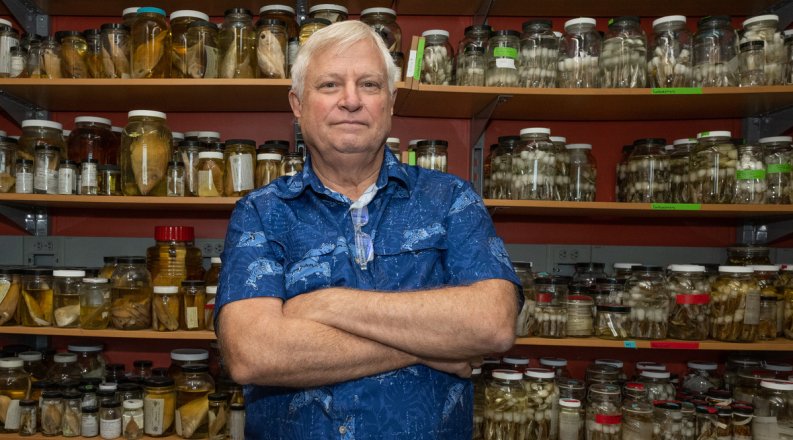By Philip Walzer
Biologist Kent Carpenter fears that Vietnam’s rush to modernization has significantly reduced the diversity of fish species in the country’s waters.
He will find out for sure when he goes there next year as part of his second Fulbright Fellowship.
The Mekong River, which flows through Vietnam, has more fish species than any river other than the Amazon, said Carpenter, a professor and Eminent Scholar of biological sciences who has taught at Old Dominion University since 1996.
Fish have swum hundreds of miles to interbreed, but the construction of hydroelectric dams has stunted their journeys.
“I want to know what happened to genetic diversity,” said Carpenter, who in 2020 received the Outstanding Faculty Award from the State Council of Higher Education for Virginia. “Genetic diversity is the basis for environmental adaptation. If they lose genetic diversity, they lose the ability to adapt to a changing world.”
Carpenter visited Vietnam four times before the pandemic to collect tissue samples from fish. When he returns, from January to June, he will analyze the results. Carpenter’s previous Fulbright, in 2011, allowed him to study the diversity of fish in the Philippines.
More than 60 Old Dominion faculty members and about a dozen graduate students have received Fulbright fellowships. In addition, the University has hosted Fulbright faculty and students from countries including Romania, Bahrain and the Philippines.
“A Fulbright award will get you noticed and quite often helps move your résumé up in the pile,” said Scott Berlin, ODU’s global engagement coordinator and Fulbright program adviser. “It’s very prestigious. Everybody knows the name.”
Even more important, “international experience opens your mind,” said Berlin, who has taught in Japan, Korea and Kuwait. “It gives you a bigger, better, wider perspective.”
When the Fulbright scholars return, they “will impart that to their students,” Berlin said. “That’s going to broaden the minds of our students and make Old Dominion more international.”
The fellowship covers airfare, living expenses and, in most cases, dependents, he said.
The deadline for faculty applications for the 2024-25 Fulbright awards is Sept. 15. Old Dominion reviews student applications before they are submitted; the internal deadline is Aug. 25.
In Vietnam, Carpenter won’t be doing only research. He will teach his online Marine Conservation Biology Course to undergraduates and graduate students at both Old Dominion and Nha Trang University on the southeastern coast of Vietnam.
They will view class sessions at different times, but they will interact in discussions on Blackboard. Carpenter also plans to meet with the Nha Trang students in person every week, hoping to hone their biological and English skills.
“I want them to understand what the challenges are to biodiversity,” he said. “As an educator, I always aspire to inspire students.”
Carpenter has received more than $12 million in funding for his work. On July 16, he spoke about another of his projects at the annual meeting in Norfolk of the American Society of Ichthyologists and Herpetologists. The title of his talk summarized the unusual nature of the research: "Genetic Time Travel in Philippine Fisheries."
With a $4.6 million grant from the National Science Foundation's Partnership for International Research and Education, Carpenter compared recent tissue samples from fish in the Philippines with those collected by a U.S. research expedition in 1908. "We found a decrease in genetic diversity after more than a century of extreme exploitation and habitat destruction in the Philippines," Carpenter said.
For more information about applying for Fulbrights, contact Scott Berlin at sberlin@odu.edu



